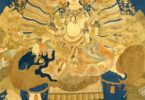《百喻经》
[The] Sūtra [Of A] Hundred Parables
卷第四
Fourth Scroll
(六六)口诵乘船法而不解用喻
[66] Parable [Of With The] Mouth Reciting Ship-Sailing Methods Yet Not Understanding [Their] Applications
昔有大长者子,共诸商人入海采宝。
[In the] past, [there] was [a] great elder’s son, together [with] many merchants entering [the] ocean [to] gather treasures.
此长者子善诵入海捉船方法,若入海水漩澓洄流矶激之处,当如是捉、如是正、如是住,语众人言:「入海方法我悉知之。」
This elder’s son [was] good [at] reciting entering [of the] ocean’s ship-steering methods, if entering [the] ocean water’s places of whirlpools, eddies, submerged rocks [and] splashes, [it] should [be] thus rowed, thus adjusted, thus stopped. [He] spoke [to] all [the] people, saying, ‘[Of] entering [the] ocean’s methods, I know them all.’
众人闻已深信其语,既至海中未经几时,船师遇病忽然便死。
All people, hearing [this] already, deeply believed [in] his words. Already arriving within [the] ocean, yet [to] pass much time, [with the] captain meeting sickness, [he] suddenly then died.
时长者子即便代处,至洄澓驶流之中唱言:「当如是捉、如是正。」
Then, [the] elder’s son immediately replaced [his] position, saying, ‘[It] should [be] thus rowed, thus adjusted.’
船盘回旋转不能前进至于宝所,举船商人没水而死。
[With the] ship winding [and] spinning, not able [to] go forward to reach [the] treasure’s place, all [the] ship’s merchants sunk [into the] water and died.
凡夫之人亦复如是,少习禅法安般数息及不净观,虽诵其文不解其义,种种方法实无所晓自言善解,妄授禅法使前人迷乱失心,倒错法相,终年累岁空无所获,如彼愚人使他没海。
Of ordinary beings’ people, [they are] likewise thus, [with] little practice [of] meditation methods, ānāpāna’s counting [of] breaths and impurity’s contemplation, although reciting their texts, not understanding their meanings. [With] all kinds [of] methods, truly without those known, personally saying [they are] well understood. Falsely teaching meditation methods, causing [the] previous persons [to be] confused [and] lose [their] minds. [With] inverted [and] wrong Dharma characteristics, [for an] entire year [and] accumulating years, empty without that obtained, [they are] like that foolish person causing others [to] sink [into the] ocean.
[Note 1: ‘Ānāpāna’ (安般) means ‘breathing in and out’, referring to ‘mindfulness of breathing’ (Ānāpānasati) meditation, with or without counting of breaths (数息) as a ‘clutch’ to help stay focused, so as to train in single-pointedness.]
[Note 2: Impurity’s contemplation (不净观) refers to meditation with sight or visualisation of the body’s parts being foul, so as to train in becoming unattached to the body.]
[Note 3: Those who talk of principles only, without having actual and proficient practices, have yet to know the true meanings of both the principles and practices. Good teachers are those who know both the principles and practices well. With the many intricate problems of different minds, even ‘basic’ meditation, if learnt from the inexperienced without proper knowledge can be dangerous.]
Namo Amituofo : Translation and notes by Shen Shi’an
上个喻
Previous Parable:
五百欢喜丸喻
[65] The Parable Of The Five Hundred Joy Pills
https://purelanders.com/2023/10/03/65-the-parable-of-the-five-hundred-joy-pills-from-the-sutra-of-a-hundred-parables
下个喻
Next Parable:
夫妇食饼共为要喻
[67] The Parable Of The Husband And Wife With Eating Cakes Together As Essential
https://purelanders.com/2023/10/03/67-the-parable-of-the-husband-and-wife-with-eating-cakes-together-as-essential-from-the-sutra-of-a-hundred-parables
全百喻
All Hundred Parables:
https://purelanders.com/baiyu





